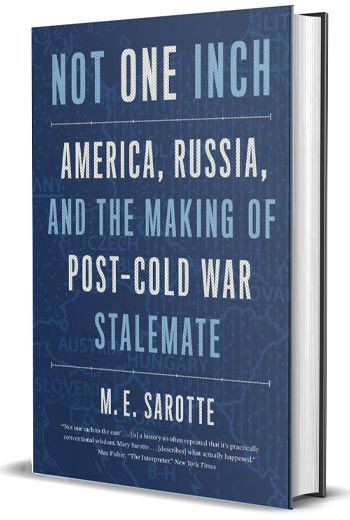2024 Jamison Lecture
/prod01/twu-cdn-pxl/media/images/history-government/sarotte-topimage.jpg)
Author Mary Elise Sarotte:
the making of post-cold war stalemate
Thursday, April 11, 2024, 7 p.m.
Phyllis J. Bridges Auditorium in the Student Union at Hubbard Hall
Mary Elise Sarotte, a leading expert on foreign policy, reveals how tensions between America, NATO and Russia transformed geopolitics.
- The lecture is free and open to the public. Registration is required.
- A question-and-answer session will follow the lecture.
- The first 50 students to attend the lecture will receive a free, signed copy of Sarotte's book, Not One Inch.
Register for the Jamison Lecture
Mary Elise Sarotte

An expert in the history of international relations, Mary Elise Sarotte is the inaugural holder of the Marie-Josée and Henry R. Kravis Distinguished Professorship of Historical Studies. She is also a research associate at Harvard University's Center for European Studies.
Sarotte earned her AB in History and Science at Harvard and her PhD in History at Yale University. She is the author or editor of six books, including The Collapse: The Accidental Opening of the Berlin Wall and 1989: The Struggle to Create Post-Cold War Europe, both of which were selected as Financial Times Books of the Year, among other distinctions and awards.
Following graduate school, Sarotte served as a White House Fellow, then joined the faculty of the University of Cambridge, where she received tenure before accepting an offer to return to the United States to teach at USC. Sarotte is a former Humboldt Scholar, a former member of the Institute for Advanced Study in Princeton, and a member of the Council on Foreign Relations.
Her most recent book is Not One Inch: America, Russia, and the Making of Post-Cold War Stalemate, on what the fight over NATO expansion did to Western relations with Russia.
Praise for Not One Inch

“Sarotte has the receipts, as it were: her authoritative tale draws on thousands of memos, letters, briefs and other once secret documents—including many that have never been published before—which both fill in and complicate settled narratives on both sides.” —Joshua Yaffa, New Yorker
“Prize-winning historian Mary Elise Sarotte . . . charts all the private discussions within the western alliance and with Russia over enlargement and reveals Russia as powerless to slow the ratchet effect of the opening of Nato’s door.” —Patrick Wintour, The Guardian
“Sarotte is the unofficial dean of ‘end of Cold War’ studies. . . . With her latest book, she tackles head-on the not-controversial-at-all questions about NATO’s eastward growth and the effect it had on Russia’s relations with the west. I look forward to the contretemps this book will inevitably produce.” —Daniel W. Drezner, Washington Post
“‘Not one inch to the east’ . . . [is] a history so often repeated that it’s practically conventional wisdom. Mary Sarotte . . . [describes] what actually happened [between the US and Russia], and how both the reality and distortion really shape today’s events.” —Max Fisher, New York Times, from “The Interpreter” newsletter
“A riveting account of NATO enlargement and its contribution to the present confrontation. Sarotte tells the story with great narrative and analytical flair, admirable objectivity, and an attention to detail that many of us who thought we knew the history have forgotten or never knew.” —Rodric Braithwaite, Financial Times
“Masterful and exhaustively researched. . . . For this well-written and pacy book, [Sarotte] has uncovered previously unpublished details of former president Bill Clinton’s role in deciding Europe’s fate.” —Con Coughlin, Sunday Telegraph
“Highly detailed, thoroughly researched, and briskly written.” —Fred Kaplan, New York Review of Books
“There’s no one who has researched the relevant sources more thoroughly than historian Mary E. Sarotte, who has just published Not One Inch . . . successfully reconstructing the most significant days [in NATO expansion].” —Stefan Kornelius, Süddeutsche Zeitung
“Sarotte weaves together the most engaging and carefully documented account of this period in East-West diplomacy currently available.” —Andrew Moravcsik, Foreign Affairs
Selected as a Foreign Affairs Best Book of 2021
2022 Arthur Ross Silver medal winner, sponsored by the Council on Foreign Relations
Shortlisted for the 2022 Cundill History Prize
Page last updated 3:37 PM, November 7, 2023